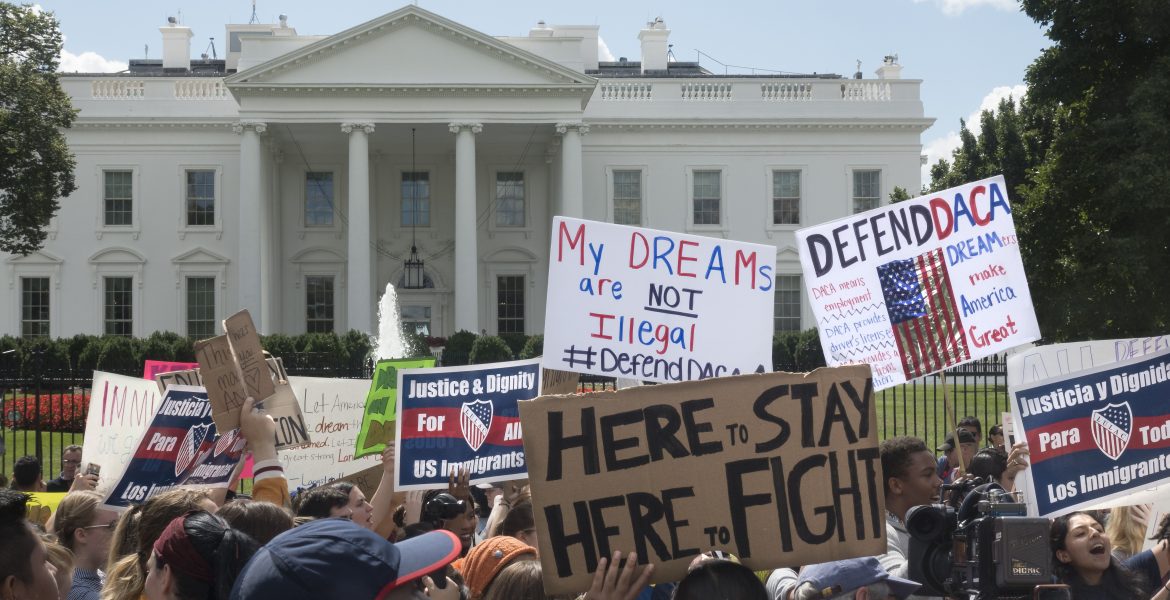Bilingual studies sophomore Alejandra Pena was preparing to submit her initial application for Deferred Action for Child Arrivals (DACA) in late August 2017. After spending much of her life “in the shadows” as Pena explains, the prospect of having protected status was exciting and life changing.
“I knew I was very much different from everyone else. My mom would always tell me to not really speak Spanish as much,” Pena said. “One time we went for competition to Laredo, and my mom was terrified of that. When we came back, and I called her, she was in tears.”
As she was preparing to apply for DACA, the Trump administration ended the program’s acceptance of initial applications on Sept. 5, 2017.
After two years of litigation, the Supreme Court heard arguments on Nov. 11 from plaintiffs across the nation suing the Trump administration over the decision to end the DACA program as recipients prepare to renew their status before its deadline on Dec. 3.
Over 200,000 students from all over the country participated in a demonstration outside the Supreme Court building in Washington, D.C., in support of the plaintiffs.
“Ni de aquí, ni de allá, neither from here, or there; it kinda feels like that sometimes,” Pena said. “Even though I have lived here my entire life, me being a human being is, to some people, is a piece of paper. So living here does feel alienating sometimes as well.”
Pena is not alone. Texas is the second largest DREAMer populated state in the country with over 226,000 undocumented youth; 109,724 of whom use the DACA program. Bexar County alone is home to over 14,000 potential DACA beneficiaries according to Dream.US, a program that awards scholarships and provides support for current and potential DACA students.
Texas A&M University-San Antonio and San Antonio College are the only two higher education institutions partnered with Dream.US to serve the DACA and undocumented populations on their campus. The program at A&M-San Antonio has grown to include 56 students and four peer mentors who talk to fellow students about career goals.
“It’s life-saving for students,” Kim Nanez, director of Student Success, said. “It can be difficult to attend college in general with very little money.”
Texas is one of ten states that offer financial aid to undocumented students. Programs such as the Texas Application for Student Aid (TAFSA) is one such program that allows for foreign or undocumented students to apply for financial aid to continue higher education.
“We do know that these scholars just about out-perform just about the rest of student demographics,” said Mona Aldano-Ramirez, a campus official at San Antonio College who is in charge of Dream.US. “They are trying to complete college, continue on to their bachelor’s institution and be contributive members of this society, much more than they are now.”
For students like Oziel Trevino Munoz, a communications senior at A&M-San Antonio campus, DACA is a pathway to something more than just documentation.
“For me, I’m going to get my bachelor’s pretty soon,” Trevino said. “I feel like Trump can’t take that away from me. He can’t take away the six years of college I spent trying to get my bachelor’s. My bachelor’s can’t be taken away, my diploma, my rights.”
Trevino, born in Monterey, Mexico, was taken to the United States before he was 2 years old. After being raised in the San Antonio area, he has worked with various media outlets such as Univision and the A&M-San Antonio Marketing and Communications department.
After starting to apply for jobs when he was 15, Trevino was told by his parents that he was undocumented and thus couldn’t work in Texas. He applied for DACA in December of 2012 and received his documentation in 2013.
“I don’t feel like it’s necessary to label people as immigrants, even though that’s what we are,” Trevino said. “Even if you take that paper away, you’re still worth it.”
Trevino and Pena are included in the population of over 800,000 recipients whose future is being discussed at the Supreme Court this week. Despite knowing what hangs in the balance, students and campus officials remain optimistic about the future.
“We’ve talked to our scholars about counseling and wellness and about the media coverage that’s happening right now,” Nanez said. “So for example, we’re going to Main Event. Just do community building things, and things that are positive. We obviously need to have realistic conversations but also a space for our students to be free and happy.”
Though she is unable to apply for DACA, Pena continues to be outspoken about the issue despite still being classified as undocumented.
“You don’t have to go to every single march or rally, just stand up for your fellow undocumented students when you can and being a good ally,” Pena said. “This school is very much DACA and undocumented student friendly; the school being as outspoken as it is and as friendly as it is, that’s making a difference.”






